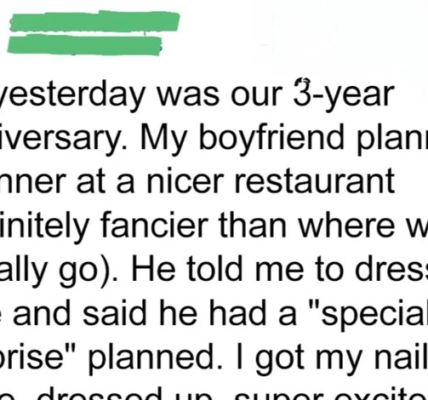HE TOOK HER OUT TO LUNCH—EVEN THOUGH SHE WASN’T THEREThe diner was busy, full of chatter and clinking silverware, but he sat quietly at his table for two. One tray. Two plates. One for him, and one carefully placed in front of a framed photograph. The woman in the picture smiled brightly, frozen in time. He adjusted the frame, making sure she had the perfect view of their meal. Then, with steady hands, he picked up a piece of fried chicken and placed it on her plate first. A waitress stopped, her voice soft. “Would you like anything else, sir?” He shook his head, smiling gently. “No, ma’am. This was her favorite.” Then, as he picked up his fork, he whispered something to the photo—something so full of love and longing that my heart ached. And in that moment, I realized… this wasn’t just lunch. It was a ritual. A testament to a love that time couldn’t erase. I watched him, fascinated and moved, as he ate his meal, occasionally pausing to tell the photograph something. He spoke of the weather, a funny story he’d heard, and how much he missed her laugh. I’m a writer, you see, and I’m always searching for stories. But this… this wasn’t a story I was going to write. It was a moment I was going to learn from. After he finished, he carefully wrapped the uneaten food on her plate, placed the photograph back in his bag, and paid the bill. As he walked past my table, I couldn’t help myself. “Excuse me, sir,” I said, my voice barely a whisper. “I couldn’t help but notice… you bring her to lunch.” He stopped, his eyes—a gentle, faded blue—meeting mine. “Yes, ma’am. Her name was Elara.” “Was?” I asked, feeling a pang of sorrow. “She passed away,” he said, his voice steady but soft. “A few years ago now. But she loved this diner, loved their fried chicken. And she always said, ‘When I’m gone, don’t forget to have lunch for two.’ So, I don’t.” I nodded, tears welling up in my eyes. “That’s… that’s beautiful.” “It’s just love,” he said simply. “And memory. They’re all we really have, aren’t they?” He smiled again, a small, sad smile, and walked out of the diner. I sat there for a long time, thinking about Elara, about her husband, about the power of a simple meal shared between two people, even when one wasn’t physically there. The next week, I found myself back at the diner. I couldn’t shake the image of the man and his photograph. I ordered the fried chicken, just to see what Elara had loved so much. It was indeed delicious. As I ate, I noticed a young woman sitting alone at a table near the window. She looked sad, her eyes red, her hands clasped tightly in her lap. I felt a familiar tug of empathy. After finishing my meal, I walked over to her table. “Excuse me,” I said gently. “I couldn’t help but notice you looked a little down.” She looked up, startled, and wiped her eyes. “It’s nothing,” she said, her voice trembling. “Just… missing someone.” “I understand,” I said, and I told her about the man and his photograph, about Elara and the fried chicken. Her eyes widened. “That’s… that’s incredible. I lost my grandmother recently,” she said. “And she loved this place too. We used to come here every Sunday.” “Maybe,” I suggested, “you could come back sometimes. For her. Have lunch for two.” She smiled, a genuine smile that reached her eyes. “That’s… that’s a wonderful idea. Thank you.” Over the next few months, I saw the man with the photograph several times. Each time, he was the same—calm, gentle, full of love. He became a fixture in the diner, a quiet reminder of enduring love. One day, I arrived to find him sitting at his usual table, but there was something different. He wasn’t looking at the photograph. He was looking out the window, a soft smile on his face. I approached him cautiously. “Everything alright?” I asked. He turned to me, his eyes sparkling. “Yes, ma’am. Everything is wonderful. You see,” he said, gesturing towards the window. “I had a dream last night. Elara told me it was time. Time for me to live again, to find joy. She told me she’d always be with me, in my heart, but it was time for me to make new memories.” My heart skipped a beat. “That’s… that’s amazing,” I said. “It is,” he said. “And you know what else?” He reached into his bag and pulled out a small, worn notebook. “I’ve been writing. Writing down all the stories Elara told me, all the memories we shared. I think I’m going to write a book.” A book. A book about love, about loss, about the enduring power of memory. It was perfect. A few months later, I received a package in the mail. Inside was a copy of his book, titled “Lunch for Two.” It was a beautiful story, filled with love, laughter, and tears. It was Elara’s story, and his story, and a story about how love never truly dies. The book became a local sensation. People were drawn to its honesty, its simplicity, its message of hope. The man, whose name was Arthur, became a local hero, a symbol of enduring love. One evening, I saw Arthur at a local bookstore, giving a reading. He was surrounded by people, all eager to hear his story. As he read, his voice filled with emotion, I realized that Elara’s legacy wasn’t just in the framed photo, or the lunch for two, but in the stories he was sharing. The twist was this: Arthur found a new love. Not a replacement, but a continuation. A woman who loved his stories, who understood his grief, and who saw the beauty in his enduring love for Elara. He didn’t forget Elara, but he learned to live again, carrying her love with him. The life lesson here is that love doesn’t end with loss. It transforms, it evolves, it finds new ways to bloom. Memories are precious, and they should be cherished, but they shouldn’t hold us back from living. Love, in all its forms, is a gift, and we should embrace it, even when it comes in unexpected ways. Don’t let grief or loss hold you back from living. Share your st
The diner was busy, full of chatter and clinking silverware, but he sat quietly at his table for two. One tray. Two plates. One for him, and one carefully placed in front of a framed photograph.
The woman in the picture smiled brightly, frozen in time. He adjusted the frame, making sure she had the perfect view of their meal. Then, with steady hands, he picked up a piece of fried chicken and placed it on her plate first.
A waitress stopped, her voice soft. “Would you like anything else, sir?”
He shook his head, smiling gently. “No, ma’am. This was her favorite.”
Then, as he picked up his fork, he whispered something to the photo—something so full of love and longing that my heart ached.
And in that moment, I realized… this wasn’t just lunch.
It was a ritual. A testament to a love that time couldn’t erase. I watched him, fascinated and moved, as he ate his meal, occasionally pausing to tell the photograph something. He spoke of the weather, a funny story he’d heard, and how much he missed her laugh.
I’m a writer, you see, and I’m always searching for stories. But this… this wasn’t a story I was going to write. It was a moment I was going to learn from.
After he finished, he carefully wrapped the uneaten food on her plate, placed the photograph back in his bag, and paid the bill. As he walked past my table, I couldn’t help myself.
“Excuse me, sir,” I said, my voice barely a whisper. “I couldn’t help but notice… you bring her to lunch.”
He stopped, his eyes—a gentle, faded blue—meeting mine. “Yes, ma’am. Her name was Elara.”
“Was?” I asked, feeling a pang of sorrow.
“She passed away,” he said, his voice steady but soft. “A few years ago now. But she loved this diner, loved their fried chicken. And she always said, ‘When I’m gone, don’t forget to have lunch for two.’ So, I don’t.”
I nodded, tears welling up in my eyes. “That’s… that’s beautiful.”
“It’s just love,” he said simply. “And memory. They’re all we really have, aren’t they?”
He smiled again, a small, sad smile, and walked out of the diner. I sat there for a long time, thinking about Elara, about her husband, about the power of a simple meal shared between two people, even when one wasn’t physically there.
The next week, I found myself back at the diner. I couldn’t shake the image of the man and his photograph. I ordered the fried chicken, just to see what Elara had loved so much. It was indeed delicious.
As I ate, I noticed a young woman sitting alone at a table near the window. She looked sad, her eyes red, her hands clasped tightly in her lap. I felt a familiar tug of empathy.
After finishing my meal, I walked over to her table. “Excuse me,” I said gently. “I couldn’t help but notice you looked a little down.”
She looked up, startled, and wiped her eyes. “It’s nothing,” she said, her voice trembling. “Just… missing someone.”
“I understand,” I said, and I told her about the man and his photograph, about Elara and the fried chicken.
Her eyes widened. “That’s… that’s incredible. I lost my grandmother recently,” she said. “And she loved this place too. We used to come here every Sunday.”
“Maybe,” I suggested, “you could come back sometimes. For her. Have lunch for two.”
She smiled, a genuine smile that reached her eyes. “That’s… that’s a wonderful idea. Thank you.”
Over the next few months, I saw the man with the photograph several times. Each time, he was the same—calm, gentle, full of love. He became a fixture in the diner, a quiet reminder of enduring love.
One day, I arrived to find him sitting at his usual table, but there was something different. He wasn’t looking at the photograph. He was looking out the window, a soft smile on his face.
I approached him cautiously. “Everything alright?” I asked.
He turned to me, his eyes sparkling. “Yes, ma’am. Everything is wonderful. You see,” he said, gesturing towards the window. “I had a dream last night. Elara told me it was time. Time for me to live again, to find joy. She told me she’d always be with me, in my heart, but it was time for me to make new memories.”
My heart skipped a beat. “That’s… that’s amazing,” I said.
“It is,” he said. “And you know what else?” He reached into his bag and pulled out a small, worn notebook. “I’ve been writing. Writing down all the stories Elara told me, all the memories we shared. I think I’m going to write a book.”
A book. A book about love, about loss, about the enduring power of memory. It was perfect.
A few months later, I received a package in the mail. Inside was a copy of his book, titled “Lunch for Two.” It was a beautiful story, filled with love, laughter, and tears. It was Elara’s story, and his story, and a story about how love never truly dies.
The book became a local sensation. People were drawn to its honesty, its simplicity, its message of hope. The man, whose name was Arthur, became a local hero, a symbol of enduring love.
One evening, I saw Arthur at a local bookstore, giving a reading. He was surrounded by people, all eager to hear his story. As he read, his voice filled with emotion, I realized that Elara’s legacy wasn’t just in the framed photo, or the lunch for two, but in the stories he was sharing.
The twist was this: Arthur found a new love. Not a replacement, but a continuation. A woman who loved his stories, who understood his grief, and who saw the beauty in his enduring love for Elara. He didn’t forget Elara, but he learned to live again, carrying her love with him.
The life lesson here is that love doesn’t end with loss. It transforms, it evolves, it finds new ways to bloom. Memories are precious, and they should be cherished, but they shouldn’t hold us back from living. Love, in all its forms, is a gift, and we should embrace it, even when it comes in unexpected ways.
Don’t let grief or loss hold you back from living. Share your stories, cherish your memories, and open your heart to new possibilities.
If this story touched your heart, please share it with someone who needs to hear it. And if you enjoyed it, give it a like. Your support means the wor


